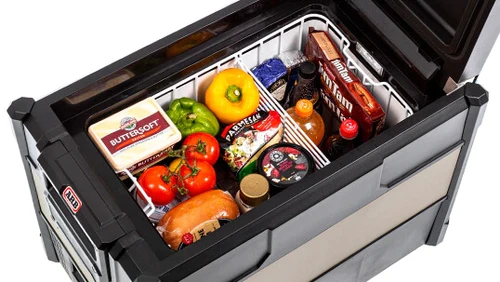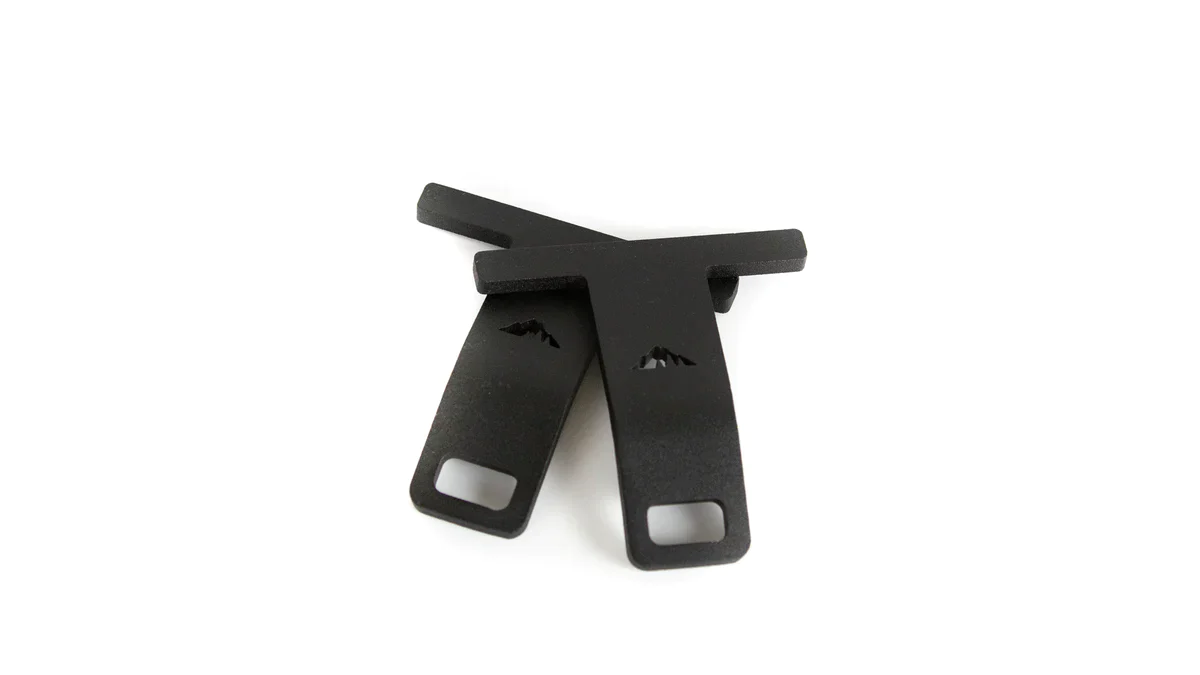Full Size Friday Blog: Week 12
This post will cover:
- Pros of Coolers
- Pros of 12V Refrigerators
- Who a Cooler is For
- Cons of Coolers
- Who a Single Zone Fridge Freezer is For
- Cons of Fridges
Which is Better for Overlanding? A Traditional Cooler and Ice, or a Power Refrigerator?
So you're ready to go from 'car camping' out of Stacy's Mom's minivan to full blown overland and truck travel? Well, gone are the days of soggy peanut butter and jelly sandwiches that sat floating in a styrofoam cooler full of luke-warm water. Now, we have the option of lobster tails and filet mignon in a truck in the middle of the Moab, but why? Well, it's because we are overlanders, and what is overlanding but an excuse to eat an overly complicated meal in the dirt for the sake of 'the gram'?
All jokes aside, food is probably one of my favorite parts of adventure camping. Admittedly, I have not made lobster in Moab, but I have made jumbo sea scallops in Ouray, so that's got to count for something.
The purpose of this weeks blog is to discuss how we get our champagne and caviar to camp without it spilling or spoiling. Therefore, we need to determine if a traditional cooler and ice or a fast-cooling power refrigerator is a better option for our overland travels.
In order to determine what features we may like best, let's first look at the 'pros' of both traditional coolers and energy efficient powered refrigerators.
Pros of Coolers:
- Affordable: Coolers are generally more budget-friendly compared to 12V refrigerators, making them accessible to a wide range of outdoor enthusiasts.
- Portability: Coolers are lightweight and easy to transport, allowing for hassle-free carrying during camping trips, picnics, and other outdoor activities.
- No Power Dependency: Coolers do not require electricity to operate, making them suitable for off-grid adventures and locations without access to power sources.
- Simple Operation: Coolers have straightforward mechanisms and require minimal setup, making them user-friendly for beginners and experienced campers alike.
- Versatility: Coolers can be used for storing food, beverages, and other perishable items, making them versatile companions for various outdoor adventures.
Pros of having a 12V Portable Refrigerator:
- Precise Temperature Control: a 12V portable refrigerator offers precise temperature settings, allowing users to control and maintain the ideal temperature for their provisions.
- Longer Cooling Duration: Unlike coolers that rely on ice, a 12V portable refrigerator provides continuous cooling without the need for ice replenishment, ensuring prolonged freshness of stored items.
- Efficient Energy Consumption: A 12V portable refrigerator are designed to operate efficiently, consuming minimal power from the vehicle's electrical system or auxiliary power source.
- Spacious Storage Capacity: 12V refrigerators come in a range of sizes and configurations, offering ample storage space for food, beverages, and other essentials during extended overland expeditions.
- Convenient Organization: Many 12V refrigerators feature adjustable shelves, removable compartments, and other organizational features, allowing users to customize the interior layout for optimal storage efficiency.
You can check out all the features of the ARB 38 QT Zero Single Zone Fridge Freezer here.
Having used both of these options for seasons upon seasons, I must say, each option has its place. That being said, I will take my Dometic 100L fridge with me 99 out of 100 times we go camping, regardless of the trip's duration. For me, it's easier. The 'set it and forget it' ideology allows me to focus more on life in the mountains and less on driving to the grocery store. However, for some, a fridge is a big purchase and a fridge can also add complicated wiring and it requires additional power considerations. For those reasons let's start with coolers first.
When I first started my elaborate truck camping journey I carried around a 65L RTIC cooler. I still have that cooler and it still holds ice for days on end. For years it served me well. It holds food and drinks for multiple days of back road travel and plenty of beer and whiskey to boot! So who is a traditional cooler for?
Who Cooler Camping is For:
- Budget-Conscious Campers: Coolers are ideal for individuals who prioritize affordability and are looking for cost-effective food storage solutions for their outdoor adventures.
- Occasional Outdoor Enthusiasts: Casual campers and picnickers who embark on infrequent outdoor trips may find coolers to be convenient and practical for storing perishable items during short excursions.
- Short-Term Trips: Coolers are well-suited for weekend getaways or day trips where temporary food storage is needed, offering portability and simplicity for quick packing and unpacking.
- Off-Grid Travelers: For those exploring remote locations without access to electricity, coolers provide a reliable means of keeping food and beverages chilled without relying on power sources.
- Beginners and Novices: Coolers are easy to use and require minimal maintenance, making them suitable for individuals new to outdoor activities who may not be familiar with more complex refrigeration systems.
A few quick things to note on the above. Off-Grid Travelers would do well with a 12v powered fridge or freezer as they are not reliant on ice, however if you have not looked long enough back through our previous blogs discussing solar power and electrical solutions and determined how to implement these things into your build, a cooler may suit your travels better than a fridge or freezer.
Additionally, coolers tend to suit beginners better since the cost of entry is generally much less and refilling ice tends to be much less stressful than monitoring your car battery levels.
That being said, coolers do have a couple of cons to add and bring into consideration as well.
Cons of Coolers:
- Ice Dependency: Regular ice replenishment needed, inconvenient for longer trips.
- Limited Cooling Duration: Ice melts over time, risking food spoilage, especially in warm climates or on extended trips.
- Bulky and Heavy: Larger coolers for extended trips can be cumbersome to transport, requiring extra effort.
- Potential Leakage: Improper sealing or damage can lead to water leakage, potentially damaging gear or creating a mess.
- Mold and Mildew Growth: Without proper cleaning, coolers are prone to mold and mildew, compromising hygiene and food safety.
- Maintenance of Coolers: Clean with mild soap and water after each use to remove food residue, dry before storage to prevent mold and mildew, store in a cool, dry place away from direct sunlight, and regularly inspect for damage and repair promptly to prevent deterioration.
You've made it this far which means you are probably not sold on coolers and ice, so let's take a look at 12V Powered Overland Refrigerators. 12V powered fridges revolutionize overland travel by offering efficient cooling without the need for ice. These modern refrigerators are powered by a vehicle's electrical system or an auxiliary 12 volt power source, providing reliable cooling performance even in remote locations. With features like precise temperature control, spacious storage capacity, and advanced technology, 12V fridges are essential companions for serious overlanders and outdoor enthusiasts seeking convenience and reliability on their extended expeditions outdoors.
Who a Fridge is For:
- Serious Overlanders Embarking on Extended Trips: Overlanders traversing vast distances and spending prolonged periods on the road require dependable cooling solutions to keep their perishable food items fresh throughout their journey. 12V powered fridges offer the reliability and efficiency needed for these extended trips, ensuring that provisions remain chilled without the hassle of regular ice replenishment.
- Outdoor Enthusiasts Exploring Remote Locations: Explorers venturing into remote and off-grid areas where access to ice or traditional cooling methods may be limited benefit greatly from the convenience of 12V powered fridges. Whether camping in secluded wilderness areas or navigating rugged terrain, these fridges provide a consistent and reliable cooling solution to preserve food and beverages, enhancing the overall outdoor experience.
- Off-Grid Travelers Seeking Reliable Cooling Solutions: Travelers seeking independence from conventional infrastructure, such as campers, van-lifers, and adventurers living off the grid, rely on 12V powered fridges to maintain their provisions' freshness without reliance on ice or electricity from external sources. These fridges offer self-sufficiency and peace of mind, allowing travelers to explore remote destinations without compromising on food safety and quality.
- Individuals with Specific Dietary Requirements or Medical Needs Requiring Precise Temperature Control: Those with dietary restrictions or medical conditions that necessitate strict temperature control for their food, medications, or perishable items find 12V powered fridges indispensable. The ability to maintain precise temperatures ensures that sensitive items remain safe for consumption, catering to the unique needs of individuals with allergies, dietary restrictions, or medical conditions.
- Adventurers Prioritizing Convenience and Reliability on Their Journeys: Outdoor enthusiasts, adventurers, and nomads prioritize convenience and reliability in their gear choices to streamline their travel experiences. 12V powered fridges offer the convenience of hassle-free cooling without the limitations of traditional coolers, allowing adventurers to focus on their journey rather than worrying about ice replenishment or food spoilage. Whether embarking on weekend getaways or long-term expeditions, these fridges provide peace of mind and enhance the overall travel experience.
As indispensable as 12V powered fridges are for serious overlanders, outdoor enthusiasts, off-grid travelers, individuals with specific needs, and adventurers prioritizing convenience, they also come with their own set of considerations. Understanding these drawbacks is crucial for making an informed decision about whether these fridges are the right choice for your home or overland camping adventures.
Cons of Fridges:
- Power Dependency: 12V powered fridges rely on a vehicle's electrical system or auxiliary power source, requiring continuous power supply, which may be challenging in remote locations or during vehicle downtime.
- Initial Cost: Compared to traditional coolers, 12V fridges have a higher upfront cost, potentially presenting a barrier for budget-conscious travelers or occasional campers.
- Limited Storage Space: While offering ample storage capacity, 12V fridges may have limited space compared to larger coolers, posing challenges for those with extensive provisions or group outings.
- Weight and Size: These fridges are bulkier and heavier than traditional coolers, occupying valuable space in vehicles and adding extra weight, which can impact fuel efficiency and vehicle handling.
- Maintenance Requirements: 12V fridges require regular maintenance to ensure optimal performance, including cleaning, monitoring power consumption, and occasional repairs, adding to the overall upkeep of the vehicle.
- Risk of Malfunction: Like any electronic device, 12V fridges are susceptible to malfunctions or technical issues, potentially disrupting food storage and requiring troubleshooting or repairs during travel.
In conclusion, both traditional coolers and 12V powered fridges offer valuable solutions designed for overland travel, each with its own set of advantages and drawbacks. Traditional coolers provide affordability, simplicity, and accessibility, making them suitable for casual outings and shorter trips. On the other hand, 12V powered fridges offer advanced cooling capabilities, convenience, and reliability, making them ideal for serious overlanders, outdoor enthusiasts exploring remote areas, and individuals with specific dietary or medical needs. Understanding the unique features and considerations of each option allows travelers to make informed choices based on their preferences, budget, and travel requirements.
Ultimately, the decision between a traditional cooler and a 12V powered fridge hinges on factors such as trip duration, destination and temperatures, storage needs, and personal preferences. While traditional coolers may suffice for occasional outings or budget-conscious travelers, serious overlanders and adventurers seeking reliable cooling solutions for extended expeditions outdoors may find the investment in a 12V powered fridge worthwhile. Regardless of the choice, prioritizing food safety, convenience, and enjoyment ensures that every overland journey you enjoy is a memorable and rewarding experience.






Leave a comment
This site is protected by hCaptcha and the hCaptcha Privacy Policy and Terms of Service apply.